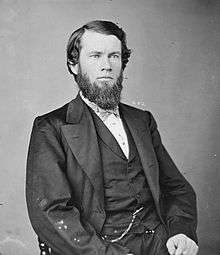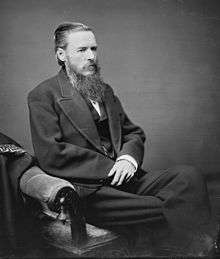44th United States Congress
| 44th United States Congress | |
|---|---|
|
43rd ← → 45th | |
|
United States Capitol (1869) | |
| March 4, 1875 – March 4, 1877 | |
| Senate President |
Henry Wilson (R) until November 22, 1875 Vacant from November 22, 1875 |
| Senate Pres. pro tem |
Thomas W. Ferry (R) from March 9, 1875 |
| House Speaker |
Michael C. Kerr (D) until August 19, 1876 Samuel J. Randall (D) from December 4, 1876 |
| Members |
76 Senators 293 Representatives 9 Non-voting members |
| Senate Majority | Republican |
| House Majority | Democratic |
| Sessions | |
|
Special: March 5, 1875 – March 24, 1875 1st: December 6, 1875 – August 15, 1876 2nd: December 4, 1876 – March 3, 1877 | |
The Forty-fourth United States Congress was a meeting of the legislative branch of the United States federal government, consisting of the United States Senate and the United States House of Representatives. It met in Washington, D.C. from March 4, 1875, to March 4, 1877, during the seventh and eighth years of Ulysses S. Grant's presidency. The apportionment of seats in the House of Representatives was based on the Ninth Census of the United States in 1870. For the first time since the American Civil War, the House had a Democratic majority. The Senate maintained a Republican majority.
Major events

- November 22, 1875: Vice President Henry Wilson died from a stroke
- June 25, 1876: Custer's Last Stand at the Battle of Little Bighorn
- July 4, 1876: United States Centennial
- November 7, 1876: United States general elections, 1876, including the disputed Presidential election of 1876, later settled with the Compromise of 1877 which ended Reconstruction.
Major legislation
- March 3, 1877: Desert Land Act, ch. 107, 19 Stat. 377
State admitted
- August 1, 1876: Colorado admitted as the 38th state
Party summary
The count below identifies party affiliations at the beginning of the first session of this Congress, and includes members from vacancies and newly admitted states, when they were first seated. Changes resulting from subsequent replacements are shown below in the "Changes in membership" section.
During this Congress, two Senate seats and one House seat were added for the new state, Colorado.
Senate
| Party (shading shows control) |
Total | Vacant | ||||
|---|---|---|---|---|---|---|
| Democratic (D) |
Anti- Monopoly (AM) | Republican (R) | Other | |||
| End of the previous congress | 20 | 0 | 51 | (Liberal Republican) 2 |
73 | 1 |
| Begin | 28 | 1 | 44 | 0 | 73 | 1 |
| End | 30 | 45 | 76 | 0 | ||
| Final voting share | 39.5% | 1.3% | 59.2% | 0.0% | ||
| Beginning of the next congress | 35 | 1 | 39 |
1 (Independent) |
76 | 0 |
House of Representatives
| Affiliation | Party (Shading indicates majority caucus) |
Total | ||||||
|---|---|---|---|---|---|---|---|---|
| Democratic (D) |
Independent Democratic (ID) |
Independent (I) |
Independent Republican (IR) |
Republican (R) |
Other | Vacant | ||
| End of previous Congress | 95 | 7 | 0 | 0 | 199 | (Liberal Republican) 4 |
290 | 2 |
| Begin | 177 | 1 | 4 | 3 | 101 | 0 | 287 | 5 |
| End | 182 | 100 | 292 | 2 | ||||
| Final voting share | 62.8% | 1.4% | 35.8% | 0.0% | ||||
| Beginning of the next Congress | 144 | 2 | 0 | 0 | 146 | 0 | 292 | 1 |
Leadership

Senate
- President: Henry Wilson (R), until November 22, 1875; vacant thereafter.
- President pro tempore: Thomas W. Ferry (R), from March 9, 1875
- Republican Conference Chairman: Henry B. Anthony
- Democratic Caucus Chairman: John W. Stevenson
House of Representatives
- Speaker: Michael C. Kerr (D), until August 19, 1876 (died)
- Samuel J. Randall (D), elected December 4, 1876
- Democratic Caucus Chairman: Lucius Quintus Cincinnatus Lamar II
- Republican Conference Chair: George W. McCrary
Members
This list is arranged by chamber, then by state. Senators are listed in order of seniority, and Representatives are listed by district.
Senate
Senators were elected by the state legislatures every two years, with one-third beginning new six-year terms with each Congress. Preceding the names in the list below are Senate class numbers, which indicate the cycle of their election. In this Congress, Class 1 meant their term began in this Congress, requiring reelection in 1880; Class 2 meant their term ended in this Congress, requiring reelection in 1876; and Class 3 meant their term began in the last Congress, requiring reelection in 1878.
House of Representatives
The names of members of the House of Representatives are preceded by their district numbers.
Changes in membership
The count below reflects changes from the beginning of the first session of this Congress.
Senate
- replacements: 4
- Democratic: 1 seat net gain
- Republican: 1 seat net loss
- deaths: 3
- resignations: 1
- vacancy: 1
- interim appointments: 3
- seats of newly admitted states: 2
- Total seats with changes: 7
| State (class) |
Vacator | Reason for change | Successor | Date of successor's formal installation |
|---|---|---|---|---|
| Louisiana (3) | Vacant | Senate had declined to seat rival claimants William L. McMillen and P. B. S. Pinchback.[1] Successor elected January 12, 1876. | James B. Eustis (D) | January 10, 1876 |
| Tennessee (1) | Andrew Johnson (D) | Died July 31, 1875. Successor appointed August 18, 1875, to continue the term. |
David M. Key (D) | August 18, 1875 |
| Connecticut (3) | Orris S. Ferry (R) | Died November 21, 1875. Successor appointed November 27, 1875, to continue the term. |
James E. English (D) | November 27, 1875 |
| Connecticut (3) | James E. English (D) | Interim appointee retired May 17, 1876 when successor elected. Successor elected May 17, 1876. |
William H. Barnum (D) | May 18, 1876 |
| Maine (2) | Lot M. Morrill (R) | Resigned July 7, 1876 to become U.S. Secretary of the Treasury. Successor appointed July 10, 1876, to continue the term. Interim appointee later elected January 17, 1877. |
James G. Blaine (R) | July 10, 1876 |
| West Virginia (1) | Allen T. Caperton (D) | Died July 26, 1876. Successor appointed August 26, 1876, to continue the term. |
Samuel Price (D) | August 26, 1876 |
| Colorado (2) | New seat | Colorado admitted to the Union August 1, 1876. First senator elected November 15, 1876 |
Henry M. Teller (R) | November 15, 1876 |
| Colorado (3) | New seat | Colorado admitted to the Union August 1, 1876. First senator elected November 15, 1876 |
Jerome B. Chaffee (R) | November 15, 1876 |
| Tennessee (1) | David M. Key (D) | Interim appointee lost special election. Successor elected January 19, 1877. |
James E. Bailey (D) | January 19, 1877 |
| West Virginia (1) | Samuel Price (D) | Interim appointee lost special election. Successor elected January 26, 1877, but seat remained vacant until successor qualified by resigning from the U.S. House on January 31, 1877. |
Frank Hereford (D) | January 31, 1877 |
House of Representatives
- replacements: 14
- Democratic: no net change
- Republican: no net change
- deaths: 9
- resignations: 6
- contested election: 5
- seats of newly admitted states: 1
- Total seats with changes: 21
| District | Vacator | Reason for change | Successor | Date successor seated |
|---|---|---|---|---|
| Georgia 9th | Vacant | Rep-elect Garnett McMillan died before taking seat | Benjamin H. Hill (D) | May 5, 1875 |
| Maine 4th | Vacant | Rep. Samuel F. Hersey died during previous congress | Harris M. Plaisted (R) | September 13, 1875 |
| New York 33rd | Vacant | Rep.-elect Augustus F. Allen died before taking seat | Nelson I. Norton (R) | December 6, 1875 |
| Massachusetts 1st | James Buffington (R) | Died March 7, 1875 | William W. Crapo (R) | November 2, 1875 |
| Oregon At-large | George A. La Dow (D) | Died May 1, 1875 | Lafayette Lane (D) | October 25, 1875 |
| Tennessee 4th | Samuel M. Fite (D) | Died October 23, 1875 | Haywood Y. Riddle (D) | December 14, 1875 |
| Connecticut 3rd | Henry H. Starkweather (R) | Died January 28, 1876 | John T. Wait (R) | April 12, 1876 |
| Florida 2nd | Josiah T. Walls (R) | Lost contested election April 19, 1876 | Jesse J. Finley (D) | April 19, 1876 |
| Illinois 3rd | Charles B. Farwell (R) | Lost contested election May 6, 1876 | John V. Le Moyne (D) | May 6, 1876 |
| Connecticut 4th | William H. Barnum (D) | Resigned May 18, 1876, after being elected to the US Senate | Levi Warner (D) | December 4, 1876 |
| Louisiana 5th | Frank Morey (R) | Lost contested election June 8, 1876 | William B. Spencer (D) | June 8, 1876 |
| Idaho Territory At-large | Thomas W. Bennett) (I) | Lost contested election June 23, 1876 | Stephen S. Fenn (D) | June 23, 1876 |
| Maine 3rd | James G. Blaine (R) | Resigned July 10, 1876, after being appointed to the US Senate | Edwin Flye (R) | December 4, 1876 |
| Kentucky 5th | Edward Y. Parsons (D) | Died July 18, 1876 | Henry Watterson (D) | August 12, 1876 |
| Pennsylvania 12th | Winthrop W. Ketcham (R) | Resigned July 19, 1876, after being appointed judge to the United States District Court for the Western District of Pennsylvania | William H. Stanton (D) | November 7, 1876 |
| South Carolina 2nd | Edmund W. M. Mackey (IR) | Seat declared vacant July 19, 1876 | Charles W. Buttz (R) | November 7, 1876 |
| Massachusetts 4th | Rufus S. Frost (R) | Lost contested election July 28, 1876 | Josiah G. Abbott (D) | July 28, 1876 |
| Colorado Territory At-large | Thomas M. Patterson (D) | Colorado admitted to the Union August 1, 1876 | Statehood achieved | |
| Colorado At-large | New seat | Colorado admitted to the Union August 1, 1876. Seat remained vacant until October 3, 1876. | James B. Belford (R) | October 3, 1876 |
| Indiana 3rd | Michael C. Kerr (D) | Died August 19, 1876 | Nathan T. Carr (D) | December 15, 1876 |
| Indiana 2nd | James D. Williams (D) | Resigned December 1, 1876, after being elected Governor of Indiana | Andrew Humphreys (D) | December 5, 1876 |
| New York 7th | Smith Ely, Jr. (D) | Resigned December 11, 1876 | David D. Field II (D) | January 11, 1877 |
| Louisiana 5th | William B. Spencer (D) | Resigned January 8, 1877, to become an associate justice of the Louisiana Supreme Court | Vacant | Not filled this term |
| West Virginia 3rd | Frank Hereford (D) | Resigned January 31, 1877, after being elected to the US Senate | Vacant | Not filled this term |
| Georgia 9th | Benjamin H. Hill (D) | Resigned March 3, 1877, after being elected to the US Senate | Vacant | Not filled this term |
Committees
Lists of committees and their party leaders, for members (House and Senate) of the committees and their assignments, go into the Official Congressional Directory at the bottom of the article and click on the link (5 links), in the directory after the pages of terms of service, you will see the committees of the Senate, House (Standing with Subcommittees, Select and Special) and Joint and after the committee pages, you will see the House/Senate committee assignments in the directory, on the committees section of the House and Senate in the Official Congressional Directory, the committee's members on the first row on the left side shows the chairman of the committee and on the right side shows the ranking member of the committee.
Senate
- Agriculture
- Appropriations
- Audit and Control the Contingent Expenses of the Senate
- Civil Service and Retrenchment
- Claims
- Commerce
- Counting the Electoral Vote (Select)
- Distributing Public Revenue Among the States (Select)
- District of Columbia
- Education and Labor
- Engrossed Bills
- Enrolled Bills
- Examine the Several Branches in the Civil Service (Select)
- Finance
- Foreign Relations
- Indian Affairs
- Judiciary
- Manufactures
- Military Affairs
- Mines and Mining
- Mississippi River Levee System (Select)
- Mississippi Election Frauds, 1876
- Naval Affairs
- Ordnance and War Ships (Select)
- Patents
- Pensions
- Post Office and Post Roads
- Private Land Claims
- Privileges and Elections
- Public Lands
- Railroads
- Revision of the Laws
- Revolutionary Claims
- Rules
- Tariff Regulation (Select)
- Territories
- Transportation Routes to the Seaboard (Select)
- Whole
House of Representatives
- Accounts
- Agriculture
- Appropriations
- Banking and Currency
- Claims
- Coinage, Weights and Measures
- Commerce
- District of Columbia
- Education and Labor
- Elections
- Enrolled Bills
- Expenditures in the Interior Department
- Expenditures in the Justice Department
- Expenditures in the Navy Department
- Expenditures in the Post Office Department
- Expenditures in the State Department
- Expenditures in the Treasury Department
- Expenditures in the War Department
- Expenditures on Public Buildings
- Foreign Affairs
- Indian Affairs
- Invalid Pensions
- Manufactures
- Mileage
- Military Affairs
- Militia
- Mines and Mining
- Mississippi Levees
- Naval Affairs
- Pacific Railroads
- Patents
- Post Office and Post Roads
- Public Buildings and Grounds
- Public Expenditures
- Public Lands
- Railways and Canals
- Revision of Laws
- Rules (Select)
- Standards of Official Conduct
- Territories
- War Claims
- Ways and Means
- Whole
Joint committees
- Conditions of Indian Tribes (Special)
- Enrolled Bills
- Frame a Form of Government for the District of Columbia
- Investigate Chinese Immigration
Employees
- Architect of the Capitol: Edward Clark
- Librarian of Congress: Ainsworth Rand Spofford
- Public Printer of the United States: Almon M. Clapp
Senate
- Chaplain: Byron Sunderland (Presbyterian)
- Secretary: George C. Gorham
- Sergeant at Arms of the Senate: John R. French
House of Representatives
- Chaplain: S. L. Townsend (Episcopalian)
- Clerk: George M. Adams
- Clerk at the Speaker’s Table: William H. Scudder
- Doorkeeper: Lafayette H. Fitzhugh
- Postmaster of the House: James M. Steuart
- Reading Clerks: [Data unknown/missing. You can help!]
- Sergeant at Arms: John G. Thompson
See also
- United States elections, 1874 (elections leading to this Congress)
- United States elections, 1876 (elections during this Congress, leading to the next Congress)
References
- ↑ Taft, George S. (1885). Compilation of Senate Election Cases from 1789 to 1885 - Pages 483 - 512. U.S. Government Publishing Office.
- Martis, Kenneth C. (1989). The Historical Atlas of Political Parties in the United States Congress. New York: Macmillan Publishing Company.
- Martis, Kenneth C. (1982). The Historical Atlas of United States Congressional Districts. New York: Macmillan Publishing Company.
External links
- Biographical Directory of the U.S. Congress
- U.S. House of Representatives: House History
- U.S. Senate: Statistics and Lists
- Congressional Directory for the 44th Congress, 1st Session.
- Congressional Directory for the 44th Congress, 1st Session (1st Revision).
- Congressional Directory for the 44th Congress, 1st Session (2nd Revision).
- Congressional Directory for the 44th Congress, 2nd Session.
- Congressional Directory for the 44th Congress, 2nd Session (Revision).




